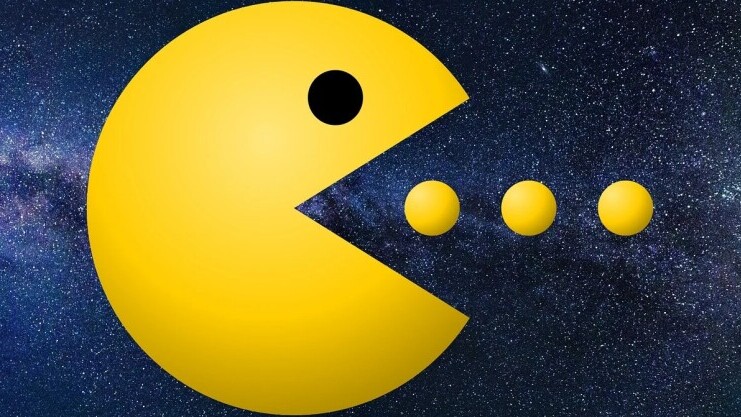
Pac Man’s a simple protagonist. He doesn’t have a scruffy beard or a worried look in his eyes. He’s doesn’t sling out quips or one-liners. He eats dots. That’s it.
That’s sort of how black holes work. They only do one thing: gobble up literally everything. But, just like Pac Man, they can only eat the stuff that’s right next to them.
Black holes and stars collide often and, usually, this results in cosmic mergers. Basically, the black hole eats the star or the star becomes a black hole and merges with the other black hole to form a single, bigger black hole.
But what if black holes could actually start hunting stars down? Obviously cosmic singularities aren’t going to grow… whatever it is that Pac Man uses to ambulate. But maybe they could just grow, like ever-increasing puddles of vacuum.
Researchers recently discovered that black holes might be expanding at the same rate as the universe after observing some of these mergers.
A team of researchers from the universities of Hawaii, Chicago, and Michigan observed black holes that were the apparent result of cosmic mergers that appeared to be far larger than astrophysicists had figured.
After running the simulations again and accounting for some new physics, the team determined the black holes are likely expanding at the same rate as the universe. The black holes are growing and becoming more powerful as the universe expands, basically.
Going back to our Pac Man analogy, this is a bit spooky. At least the ghosts are safe until Pac Man gobbles up a power pellet. Nothing escapes a black hole, not even light.
However, in all fairness, a new MIT study did recently confirm suspicions that black holes can use the destructive force of their inescapable vacuum to destabilize stars and create heavy metals. Lemmy would approve.
In some collisions between neutron stars and black holes, rather than swallow the star entirely, the energy produced through destabilization created gold and platinum elements.
It’s unclear if the gold and platinum would just end up in the black hole anyway, especially if black holes really are expanding with the universe and the metals are free-floating.
Of course, as one would imagine, black holes aren’t the best metal factories. It may be possible for such collisions to produce some gold and platinum, but far more heavy metal is created when two stars collide.
Scientists hope we’ll gain new insights into black holes, including details about the formation of some of the universe’s earliest singularities, once the next generation of space telescopes and observatories are in place over the next few years.
Get the TNW newsletter
Get the most important tech news in your inbox each week.





